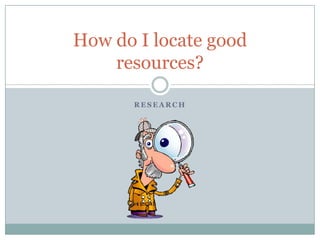
Locating resources2
- 1. Research How do I locate good resources?
- 2. Identify the Most Relevant Resources Encyclopedia Articles Provide an overview of your topic Specialized Reference Works Encyclopedias with information on a specific subject matter (i.e. poetry) Documentaries Include interviews, speeches, and footage Magazines and Newspapers Gives insight into a topic’s perceived importance Interviews and Oral Histories First hand testimony about history and culture Original Research Information you discover yourself
- 3. Choose the Right Research Tools Primary Sources materials written or created by people who took part in events or observed them. Secondary Sources records created after events occurred by people who were not directly involved.
- 4. Primary Source Examples Letters, diaries, speeches, photographs, autobiographies, e-mails, weblogs, first-person newspaper and magazine articles, public documents (birth certificates) Advantages Firsthand information Can give insight into attitudes and beliefs of the times May contain specific details Disadvantages Limited perspective May need interpretation May be biased
- 5. Secondary Source Examples Biographies, textbooks, encyclopedias, third-person newspaper and magazine articles, most documentaries Advantages Sometimes include excerpts from primary sources Often have a broad perspective and consider many viewpoints Useful for getting an overview of a topic Disadvantages Only as reliable as the sources on which they are based May be biased
- 6. Types of Online Resources Search Engines Databases
- 7. Search Engines For the best results, click on the search engine’s “advanced search” or “search tips” link. Follow these rules for effective internet searches: Be specific Use search limiters Choose the most relevant pages
- 8. Databases A database is any organized collection of data. Types of databases: Internet Search Engines (google.com) Library Catalogues Newspaper Databases (New York Time index) Article Databases (InfoTrac) Genealogy Databases (ancestry.com)
- 9. Advantages of Specialized Databases Specificity Targeted No Advertisements Access to the “Invisible Web” Many web pages are available through subscription only Abstracts A short summary of an article’s content
- 10. Which sources make the most sense for your research? List, in order, the sources you believe will be most helpful in researching your debate topic.